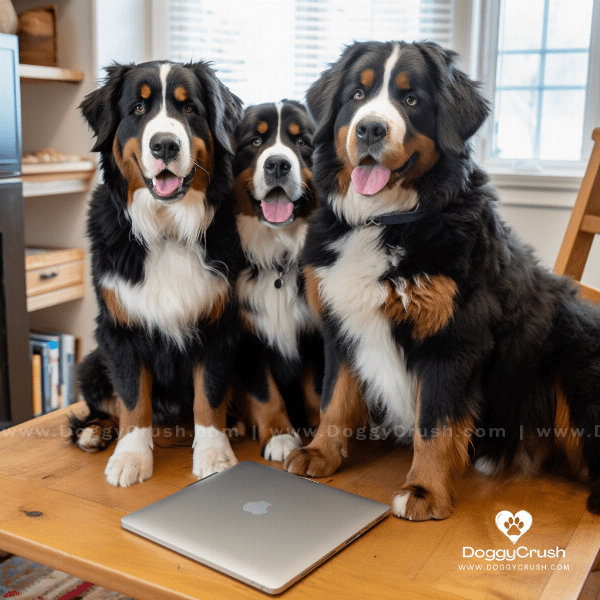Table of Contents
- History and Origin of Bernese Mountain Dogs
- Physical Characteristics and Appearance of the Breed
- Temperament and Personality Traits of Bernese Mountain Dogs
- Health Issues and Concerns to Watch Out for in the Breed
- Proper Nutrition and Exercise for Bernese Mountain Dogs
- Training and Socialization Tips for Bernese Mountain Dogs
- Grooming and Maintenance of Bernese Mountain Dogs
- Living with a Bernese Mountain Dog: Considerations and Precautions
- Activities and Sports That Bernese Mountain Dogs Excel In
- Finding the Perfect Bernese Mountain Dog for You: Adoption and Breeder Options
History and Origin of Bernese Mountain Dogs
Bernese Mountain Dogs, or Berners, are a large breed that hails from the Swiss Alps. They are one of four breeds of Sennenhund-type dogs, which were traditionally used as working dogs by Alpine herders and dairymen. Berners were specifically bred for tasks such as pulling carts, herding livestock, and serving as watchdogs.
Ancestry and Development of the Breed
The origins of Bernese Mountain Dogs can be traced back to the Roman invasion of Switzerland in the first century BC. The invading army brought with them mastiff-type dogs, which were then bred with local dogs to create the foundation of the Berner breed.
Over time, these dogs were refined and developed to suit the specific needs of Alpine farmers and herders. By the 19th century, Berners had become a distinct breed with a reputation for their strength, endurance, and loyalty.
Early Recognition and Popularity
Despite their long history, Bernese Mountain Dogs were not officially recognized as a breed until the early 20th century. The Swiss Kennel Club registered the first Berner, a dog named Bern, in 1902.
Since then, Bernese Mountain Dogs have gained popularity around the world for their friendly and loyal nature. They have been used as therapy dogs, search and rescue dogs, and even as actors in movies and TV shows.
Present-day Status and Conservation Efforts
Today, Bernese Mountain Dogs are recognized by all major kennel clubs and are a beloved family pet for many households. However, like many purebred dogs, they are prone to certain health issues, such as hip dysplasia and cancer.
To address these concerns, various organizations have been established to promote the health and well-being of Berners. The Bernese Mountain Dog Club of America and the Berner-Garde Foundation are just two examples of groups dedicated to preserving the breed and improving its genetic health.
In conclusion, the history and origin of Bernese Mountain Dogs is a fascinating story that spans centuries. From their humble beginnings as working dogs in the Swiss Alps to their present-day status as beloved family pets, Berners have come a long way. Despite the challenges they face, the future looks bright for this noble breed.
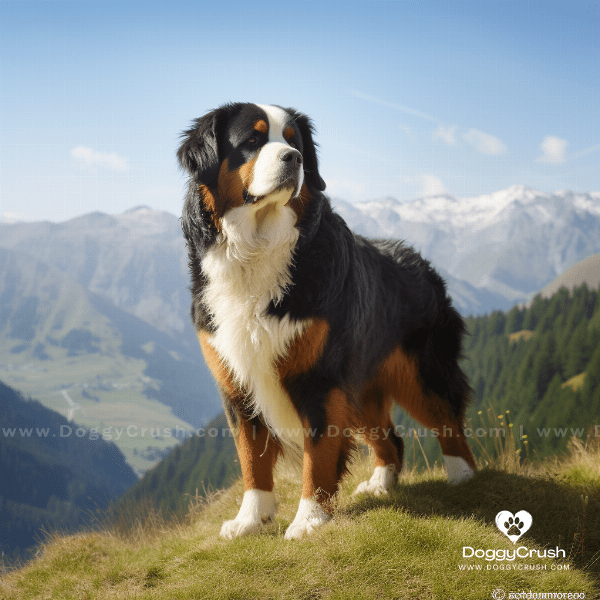
Physical Characteristics and Appearance of the Breed
Bernese Mountain Dogs are a large, sturdy breed with a distinctive tricolored coat. They are known for their friendly expression, intelligence, and imposing size.
Size and Weight
Berners are considered a large breed, with males typically standing 25-28 inches tall at the shoulder and weighing 80-115 pounds. Females are slightly smaller, standing 23-26 inches tall and weighing 70-95 pounds.
Coat and Coloration
One of the most recognizable features of Bernese Mountain Dogs is their striking coat. They have a double-layered coat that is thick, soft, and shiny. The topcoat is long and slightly wavy, while the undercoat is dense and woolly.
Berners are always tricolored, with a base color of jet black and rust-colored markings on their cheeks, legs, and over their eyes. They also have white markings on their chest, feet, and sometimes on their face.
Head and Body
The head of a Bernese Mountain Dog is large and square, with a strong jaw and alert expression. They have medium-sized, triangular ears that hang down close to their head.
Their body is muscular and well-proportioned, with a broad chest and straight back. Berners have strong, straight legs and round, compact feet.
Other Physical Features
Bernese Mountain Dogs have a variety of physical features that are unique to their breed. They have a black nose and dark, expressive eyes that give them a friendly and intelligent expression. They also have a long, bushy tail that is typically held low when they are relaxed and raised when they are excited.
In conclusion, Bernese Mountain Dogs are a large and imposing breed with a distinctive tricolored coat and a friendly expression. Their size, coat, and other physical features make them a unique and recognizable breed that is beloved by many.

Temperament and Personality Traits of Bernese Mountain Dogs
Bernese Mountain Dogs are known for their friendly, gentle nature and their loyalty to their owners. They are a social breed that thrives on human companionship and loves to be around people.
Friendly and Affectionate
One of the most notable traits of Bernese Mountain Dogs is their friendliness. They are known to be extremely affectionate and enjoy spending time with their family members. They are also known to be good with children and other pets, making them an ideal family pet.
Calm and Patient
Despite their large size, Bernese Mountain Dogs are generally calm and patient animals. They are not overly energetic and are content to lounge around the house with their owners. They are also very patient with children and are not easily provoked.
Intelligent and Trainable
Berners are a highly intelligent breed that is easy to train. They are eager to please their owners and respond well to positive reinforcement training methods. They are also very food motivated, which can be helpful when training them.
Watchful and Protective
Although they are friendly and gentle, Bernese Mountain Dogs are also known to be watchful and protective of their family. They make excellent watchdogs and will alert their owners to any potential danger. However, they are not typically aggressive and are more likely to bark than to attack.
Potential Challenges
While Bernese Mountain Dogs make wonderful family pets, there are some potential challenges to consider. They are a large breed and require a significant amount of space and exercise. They also shed quite a bit and require regular grooming to keep their coats looking their best.
In conclusion, Bernese Mountain Dogs are a friendly and affectionate breed with a calm and patient temperament. They are highly intelligent and trainable, making them an ideal choice for many families. While they do have some potential challenges, their loyalty and loving nature make them a beloved pet for many.
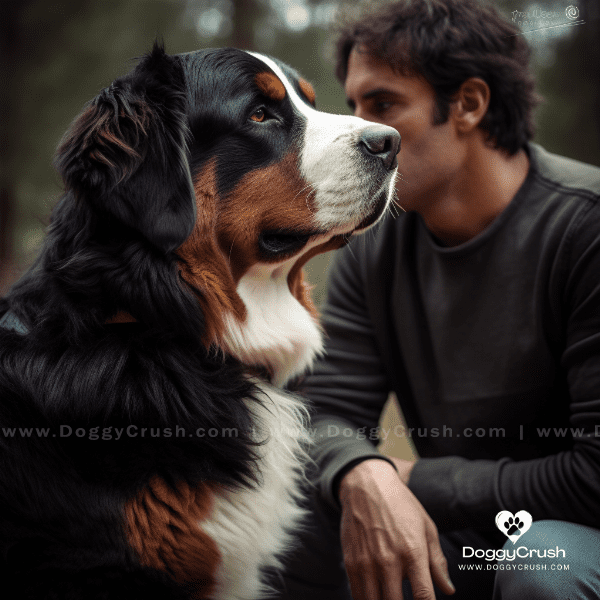
Health Issues and Concerns to Watch Out for in the Breed
Like all breeds, Bernese Mountain Dogs are susceptible to certain health issues. It is important for prospective owners to be aware of these concerns so they can provide the best possible care for their pet.
Hip Dysplasia
One of the most common health issues in Bernese Mountain Dogs is hip dysplasia. This is a genetic condition in which the hip joint does not form properly, leading to pain and lameness. To reduce the risk of hip dysplasia, it is important to purchase a puppy from a reputable breeder who performs hip screening tests on their breeding dogs.
Cancer
Unfortunately, Bernese Mountain Dogs are also prone to developing cancer. The most common type of cancer in this breed is malignant histiocytosis, which affects the immune system. Other types of cancer that are common in Berners include lymphoma and osteosarcoma.
Bloat
Bloat, also known as gastric torsion, is a serious condition that can affect Bernese Mountain Dogs. It occurs when the stomach twists on itself, cutting off blood flow and causing a range of symptoms such as vomiting and bloating. Bloat is more common in large breeds like Berners, so it is important to take precautions such as feeding smaller meals throughout the day and avoiding vigorous exercise immediately after eating.
Other Health Concerns
In addition to these major health concerns, Bernese Mountain Dogs are also prone to other conditions such as eye problems, skin allergies, and heart disease. Regular check-ups with a veterinarian and maintaining a healthy diet and exercise routine can help reduce the risk of these issues.
Conclusion
While Bernese Mountain Dogs are generally healthy and hardy, they are susceptible to certain health issues that prospective owners should be aware of. By taking preventative measures such as screening breeding dogs for hip dysplasia and providing regular veterinary care, owners can help ensure that their Berner lives a long and healthy life.

Proper Nutrition and Exercise for Bernese Mountain Dogs
Maintaining a healthy diet and exercise routine is crucial for the overall health and well-being of Bernese Mountain Dogs. Here are some guidelines for providing your Berner with proper nutrition and exercise:
Nutrition
Bernese Mountain Dogs require a balanced and nutritious diet that is appropriate for their age, size, and activity level. It is important to choose a high-quality dog food that is specifically formulated for large breeds. Look for a food that contains high-quality proteins, such as chicken or fish, and avoid foods that contain fillers or artificial preservatives.
It is also important to monitor your Berner’s weight and adjust their food intake as needed. Obesity is a common health issue in Berners, and can lead to a range of health problems.
Exercise
Bernese Mountain Dogs require regular exercise to maintain their physical and mental health. They enjoy daily walks and hikes, and also enjoy playing in a fenced yard or participating in activities such as swimming or agility training.
It is important to provide your Berner with enough exercise to prevent obesity and promote good health, but it is also important to avoid overexertion. Berners are prone to certain joint issues, such as hip dysplasia, so it is important to avoid high-impact activities such as running on hard surfaces.
Water
Finally, it is important to ensure that your Bernese Mountain Dog has access to clean, fresh water at all times. Dehydration can lead to a range of health problems, including urinary tract infections and kidney stones.
In conclusion, providing your Bernese Mountain Dog with proper nutrition and exercise is essential for their health and well-being. By choosing a high-quality dog food, monitoring their weight, and providing them with regular exercise, you can help ensure that your Berner lives a long and healthy life.
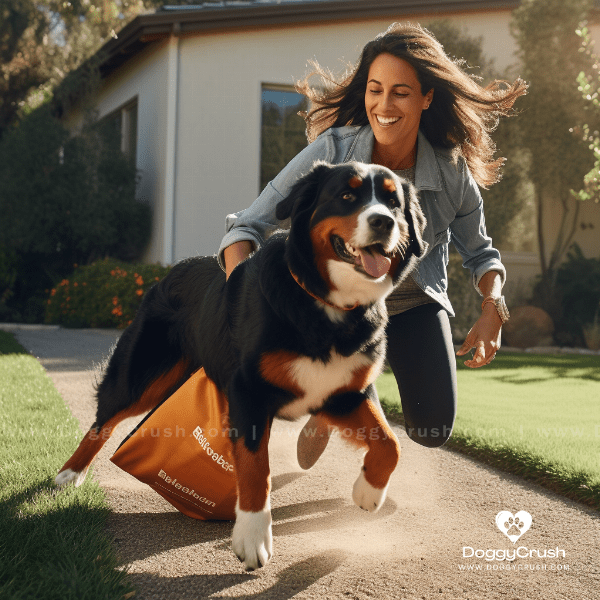
Training and Socialization Tips for Bernese Mountain Dogs
Training and socialization are important aspects of raising a happy and well-adjusted Bernese Mountain Dog. Here are some tips for training and socializing your Berner:
Start Early
It is important to begin training and socialization early in your Bernese Mountain Dog’s life. Puppies are most receptive to new experiences and can learn important socialization skills that will help them interact positively with other dogs and people.
Use Positive Reinforcement
Bernese Mountain Dogs respond best to positive reinforcement training methods, such as rewards-based training. This involves rewarding your Berner with treats, praise, and affection when they exhibit desirable behaviors.
Socialize with Other Dogs and People
Socialization is crucial for Bernese Mountain Dogs, as they are a social breed that enjoys spending time with people and other dogs. It is important to expose your Berner to a variety of new experiences, such as meeting new people and dogs, visiting new places, and experiencing new sights and sounds.
Provide Plenty of Exercise and Mental Stimulation
Bernese Mountain Dogs are an active breed that require plenty of exercise and mental stimulation to stay healthy and happy. Regular walks, playtime, and training sessions can help keep your Berner physically and mentally stimulated.
Be Patient and Consistent
Training and socializing a Bernese Mountain Dog requires patience and consistency. It is important to be patient with your Berner and to avoid becoming frustrated or angry if they do not respond immediately to your commands. Consistency is also key, as this will help reinforce good behavior and prevent bad habits from forming.
In conclusion, training and socialization are important aspects of raising a happy and well-adjusted Bernese Mountain Dog. By starting early, using positive reinforcement, socializing with other dogs and people, providing plenty of exercise and mental stimulation, and being patient and consistent, you can help ensure that your Berner grows up to be a well-behaved and well-adjusted member of your family.
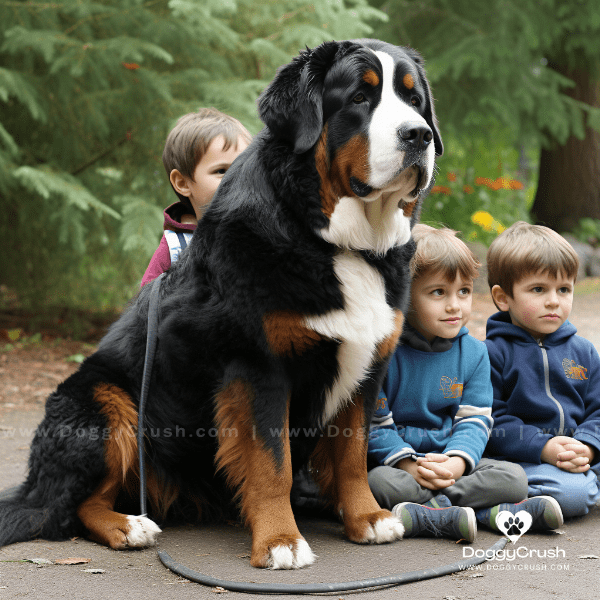
Grooming and Maintenance of Bernese Mountain Dogs
Proper grooming and maintenance are essential for keeping your Bernese Mountain Dog healthy and comfortable. Here are some tips for grooming and maintaining your Berner:
Coat Care
Bernese Mountain Dogs have a thick, double-layered coat that requires regular brushing and grooming to prevent matting and tangles. It is important to brush your Berner’s coat at least once a week, and more frequently during shedding season.
In addition to regular brushing, it is also important to bathe your Berner as needed. Be sure to use a dog-specific shampoo and to rinse thoroughly to avoid skin irritation.
Nail Care
Trimming your Bernese Mountain Dog’s nails is an important aspect of grooming and maintenance. Long nails can cause discomfort and even lead to injury, so it is important to trim them regularly.
If you are uncomfortable trimming your Berner’s nails yourself, you can take them to a professional groomer or veterinarian to have them trimmed.
Dental Care
Dental care is an often-overlooked aspect of grooming and maintenance for Bernese Mountain Dogs. It is important to brush your Berner’s teeth regularly to prevent plaque buildup and tooth decay.
You can use a dog-specific toothbrush and toothpaste to make the process easier. It is also important to provide your Berner with dental chews and toys to help keep their teeth clean and healthy.
Ear Care
Bernese Mountain Dogs are prone to ear infections, so it is important to keep their ears clean and dry. Use a dog-specific ear cleaning solution and cotton balls to clean your Berner’s ears regularly, being careful not to insert anything into the ear canal.
Conclusion
Proper grooming and maintenance are essential for keeping your Bernese Mountain Dog healthy and comfortable. By regularly brushing and grooming their coat, trimming their nails, providing dental care, and cleaning their ears, you can help ensure that your Berner looks and feels their best.
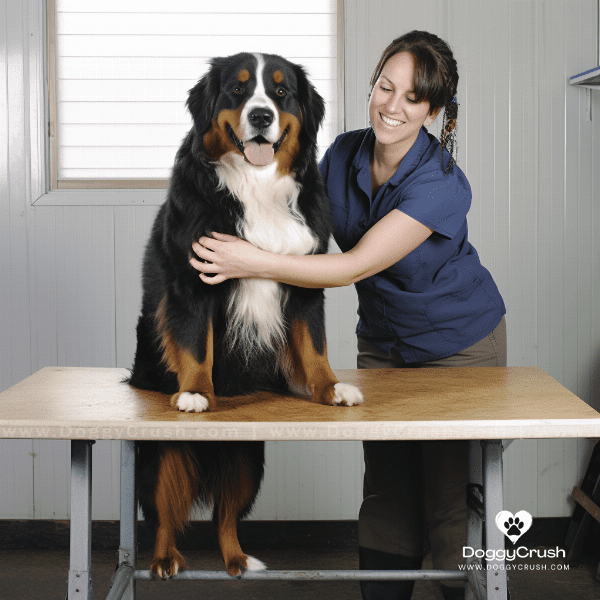
Living with a Bernese Mountain Dog: Considerations and Precautions
Bernese Mountain Dogs make wonderful family pets, but there are some considerations and precautions to keep in mind when living with a Berner.
Space Requirements
Bernese Mountain Dogs are a large breed and require plenty of space to move around and exercise. They are not well-suited to small apartments or homes without a yard. It is important to provide your Berner with plenty of space to move around and play.
Shedding
Bernese Mountain Dogs have a thick, double-layered coat that sheds heavily twice a year. Regular grooming and brushing can help reduce shedding, but it is important to be prepared for the amount of shedding that comes with owning a Berner.
Health Issues
As discussed earlier, Bernese Mountain Dogs are prone to certain health issues such as hip dysplasia, cancer, and bloat. It is important to be aware of these issues and to provide your Berner with regular veterinary care to prevent and treat any health problems.
Socialization
Bernese Mountain Dogs are a social breed and require plenty of interaction with their owners and other dogs. It is important to socialize your Berner early and often to prevent behavioral issues and to help them interact positively with other dogs and people.
Exercise
Bernese Mountain Dogs require regular exercise to stay healthy and happy. It is important to provide your Berner with daily walks and playtime, as well as opportunities for more vigorous exercise such as hiking and swimming.
Training
Bernese Mountain Dogs are intelligent and trainable, but they can also be stubborn at times. It is important to provide your Berner with consistent training and positive reinforcement to ensure good behavior and prevent bad habits from forming.
Conclusion
Living with a Bernese Mountain Dog requires some considerations and precautions, but the rewards of owning this wonderful breed are many. By providing your Berner with plenty of space, regular grooming and veterinary care, socialization, exercise, and training, you can help ensure that your Berner is a happy and well-adjusted member of your family.

Activities and Sports That Bernese Mountain Dogs Excel In
Bernese Mountain Dogs are a versatile breed that excel in a variety of activities and sports. Here are some of the activities and sports that Berners are well-suited for:
Draft Work
Bernese Mountain Dogs were originally bred as draft animals, and they have a natural aptitude for pulling carts and other loads. Many Berners enjoy participating in draft work competitions, where they are judged on their ability to pull a certain weight over a set distance.
Agility
Agility is a popular dog sport that involves navigating a series of obstacles such as jumps, tunnels, and weave poles. Bernese Mountain Dogs are well-suited to this sport due to their athleticism and intelligence. Many Berners enjoy the challenge of agility and excel in competitions.
Obedience
Obedience training is an important aspect of owning any dog, but Bernese Mountain Dogs are particularly well-suited to this sport due to their intelligence and trainability. Many Berners enjoy competing in obedience trials, where they are judged on their ability to follow commands and complete a series of tasks.
Herding
While Bernese Mountain Dogs are not typically used for herding, they have a natural instinct to gather and control livestock. Many Berners enjoy participating in herding trials, where they are judged on their ability to work with sheep or other livestock.
Therapy Work
Bernese Mountain Dogs are known for their gentle and friendly nature, making them well-suited to therapy work. Many Berners participate in therapy programs where they visit hospitals, nursing homes, and other facilities to provide comfort and companionship to patients.
Conclusion
Bernese Mountain Dogs are a versatile breed that excel in a variety of activities and sports. Whether it’s draft work, agility, obedience, herding, or therapy work, there is something for every Berner to enjoy. By providing your Berner with opportunities to participate in these activities, you can help keep them physically and mentally stimulated, and strengthen the bond between you and your pet.
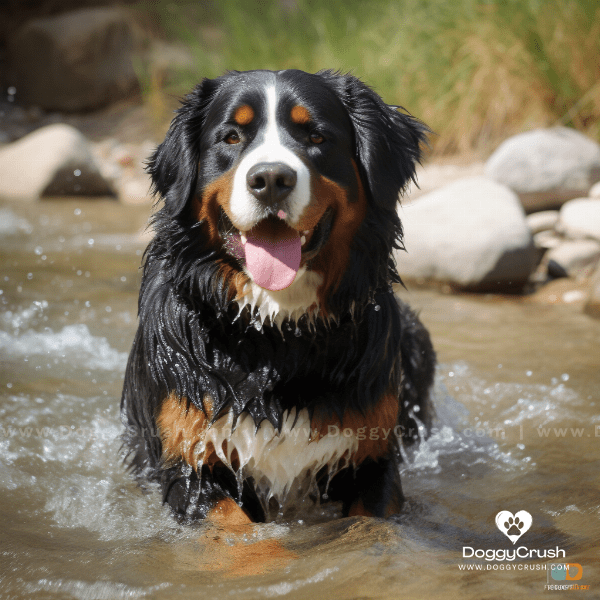
Finding the Perfect Bernese Mountain Dog for You: Adoption and Breeder Options
If you have decided that a Bernese Mountain Dog is the right breed for you, there are several options for finding the perfect pup. Here are some adoption and breeder options to consider:
Adoption
Adopting a Bernese Mountain Dog from a rescue or shelter is a great option for those who want to give a loving home to a dog in need. There are many Bernese Mountain Dog rescues and shelters throughout the country, and adopting from one of these organizations can be a rewarding experience.
When adopting a Berner, it is important to research the rescue or shelter and to ask questions about the dog’s background and temperament. Many rescue organizations will provide you with information about the dog’s health and behavior, as well as any training or socialization they have received.
Breeders
If you decide to purchase a Bernese Mountain Dog from a breeder, it is important to do your research and find a reputable breeder who prioritizes the health and well-being of their dogs.
Look for a breeder who is a member of a breed club or organization, and who performs health screenings on their breeding dogs. A good breeder will also provide you with information about the dog’s temperament, as well as any health guarantees or warranties.
Conclusion
Finding the perfect Bernese Mountain Dog for you can take some time and effort, but the rewards of owning this wonderful breed are many. Whether you choose to adopt from a rescue or shelter or purchase from a reputable breeder, be sure to do your research and find a dog that fits your lifestyle and personality.
By providing your Berner with plenty of love, attention, and care, you can help ensure that they live a long and happy life as a beloved member of your family.
